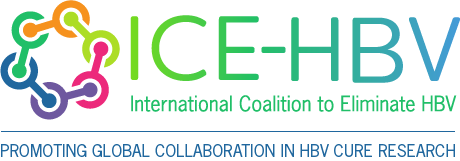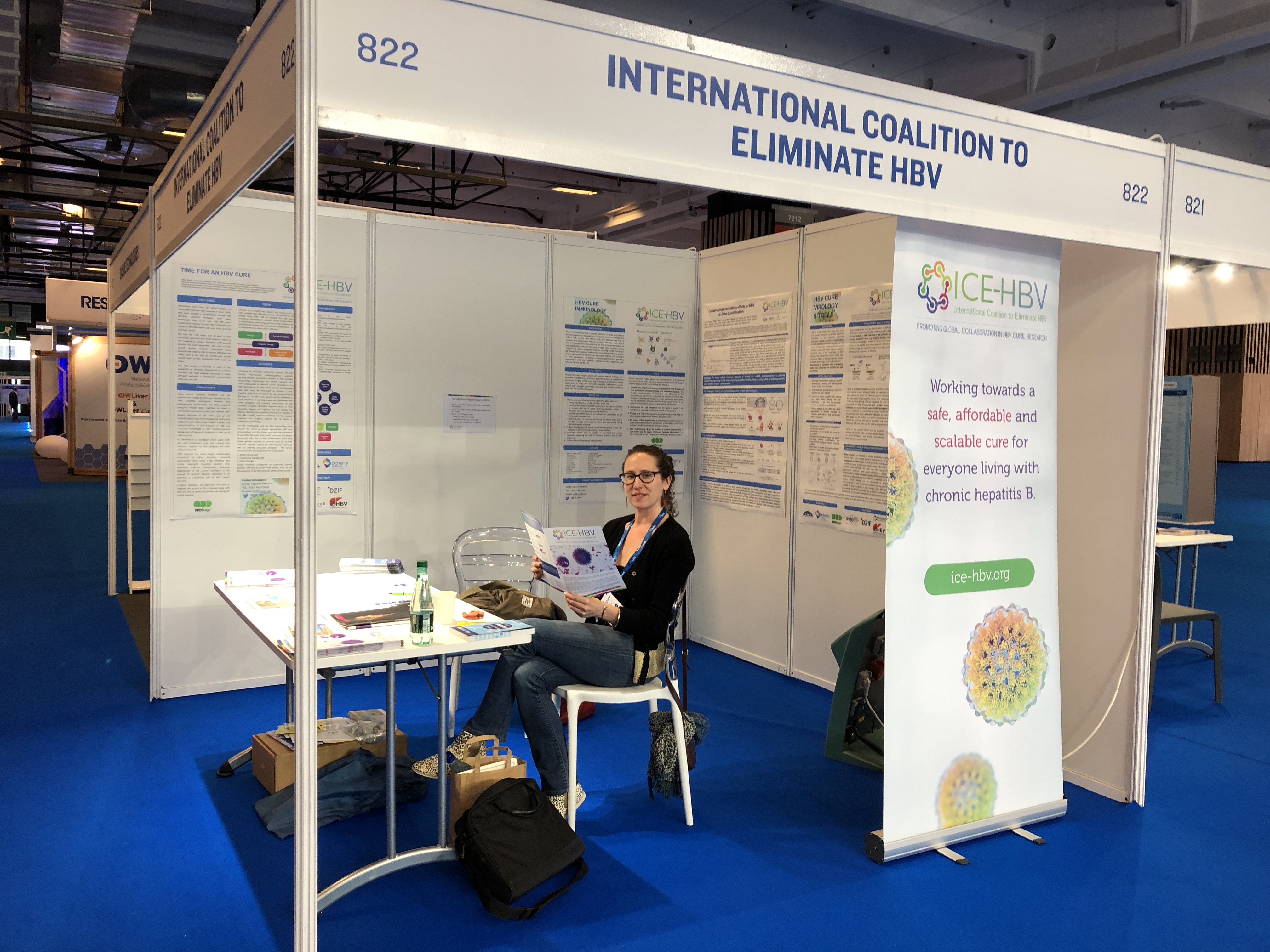On the opening day of the EASL International Liver Congress taking place in Vienna, Austria, the International Coalition to Eliminate HBV (ICE-HBV), a global group of researchers, patient representatives and health organisations, will launch a Global Scientific Strategy to Cure Hepatitis B. The Strategy will be published simultaneously in The Lancet Gastroenterology & Hepatology and webcast live at https://ilc-congress.eu/
What: Launch of the ICE-HBV Global Scientific Strategy to Cure Hepatitis B at the European Association for the Study of the Liver (EASL) The International Liver Congress
Where: Press Conference Room, (Lehar 1), Ground floor, Reed Messe Wien Congress and Exhibition Center, Trabennstraße 7, 1020 Vienna, Austria
When: 11:30 CEST, Wednesday, 10th April
Who:
• Professor Peter Revill, ICE-HBV Chair at the Doherty Institute, Melbourne, Australia
• Professor Anna Suk-Fong Lok, Alice Lohrman Andrews Research Professor in Hepatology at the Department of Internal Medicine at the University of Michigan Health System in Ann Arbor, MI., USA
• Dr Mark Bulterys, Team Leader, Global Hepatitis Programme, World Health Organization, Geneva, Switzerland
• Dr Su Wang, President-Elect, World Hepatitis Alliance, Board Member, Hepatitis B Foundation, New York, USA
• Professor Markus Cornberg, Scientific Committee member, European Association for the Study of the Liver (EASL), Hannover, Germany
• Professor Fabien Zoulim, ICE-HBV Deputy Chair & Vice-President of the scientific advisory board and head of the HBV cure programme, French Agency for Research on AIDS and Viral Hepatitis (ANRS), Paris, France.
HBV and HCC Funding Opportunities Available
POSTED ON: 28 Feb, 2019Below you will find summaries of recently announced opportunities from the United States (US) National Institutes of Health (NIH). Also note that there have been announcements, and we expect there to be additional ones, of research support for HBV and HCC from the US Department of Defense’s Peer Reviewed extramural program (search for CDMRP and PRMRP). This information is also available on the Hepatitis B Foundation website.
| Please be sure to review the key dates, especially the expiration date as some of these announcements are set to renew.
*UPCOMING SBIR Contract in FY2020– Antiviral Drugs To Cure Chronic Hepatitis B Virus Infection. NIAID topic for NIH SBIR contract solicitation.
*NIH/NIAID– Research to Advance HBV Cure: HIV/HBV Co-Infection and HBV Mono-Infection (RO1 Clinical Trial Not Allowed: The purpose of this Funding Opportunity Announcement (FOA) is to invite applications for support of innovative basic, translational, and clinical research to identify and address the challenges to achieving hepatitis B virus (HBV) cure in the presence or absence of human immunodeficiency virus (HIV). https://grants.nih.gov/grants/guide/pa-files/PAS-19-097.html
*NIH/NIAID– HIV and Hepatitis B Co-Infection: Advancing HBV Functional Cure through Clinical Research (R21): The purpose of this Funding Opportunity Announcement (FOA) is to fill scientific gaps needed to (a) inform HBV functional cure strategies by furthering our understanding of unique challenges impacting HBV and HIV co-infected hosts and (b) advance the discovery and development of novel HBV interventions that are safe and achieve a functional cure in HIV and HBV co-infected individuals. https://grants.nih.gov/grants/guide/pa-files/pa-17-278.html
*NIH/NCI– Epidemiologic Research on Emerging Risk Factors and Liver Cancer Susceptibility (R21 and R01 – Clinical Trial Not Allowed):The purpose of this concept initiative is to promote etiologic research investigating novel and innovative hypotheses on emerging risk factors (biological, environmental, and social) and their interplay with established risk factors (e.g., viral hepatitis) associated with the development of liver cancer (hepatocellular carcinoma and other histological subtypes) in the United States. https://grants.nih.gov/grants/guide/pa-files/pa-18-677.html
NIH/NIDA/NIAAA– Pilot and Feasibility Studies in Preparation for Drug and Alcohol Abuse Prevention Trials (R34 Clinical Trial Optional): This Funding Opportunity Announcement (FOA) for R34 applications seeks to support: (a) pilot and/or feasibility testing of innovative new, revised, or adapted prevention intervention approaches to prevent or delay the initiation and onset of drug and alcohol use, the progression to misuse or problem use or alcohol and other substance use disorder, reduce drinking and driving and deaths related to impaired driving, and the drug- or alcohol-related acquisition or transmission of HIV infection and viral hepatitis among diverse populations and settings; and, (b) pre-trial feasibility and acceptability testing for prevention services and systems research. It is expected that research conducted via this R34 mechanism will consist of studies that are a pre-requisite for preparing and submitting subsequent applications for larger scale drug or alcohol abuse prevention and/or drug- or alcohol-related HIV prevention intervention studies. This R34 FOA does not support applications for which the sole focus is development of intervention protocols, manuals, or the standardization of protocols. Any intervention development work must be embedded within a pilot/feasibility study. Of particular interest is prevention research that addresses current public health priorities and priority settings and systems. https://grants.nih.gov/grants/guide/pa-files/pa-18-775.html
NIH/-NICHD– Advancing Understanding, Prevention, and Management of Infections Transmitted from Women to their Infants (R01 Clinical Trial Optional): The purpose of this funding opportunity announcement (FOA) is to stimulate investigations including translational, epidemiologic and clinical studies and trials that improve the understanding, prevention and clinical outcomes of non-HIV infections transmitted from women to their offspring during pregnancy, labor and delivery, and breastfeeding. NICHD is committed to supporting research that will increase scientific understanding of and treatments for high-priority perinatal infections. https://grants.nih.gov/grants/guide/pa-files/PA-18-031.html
*NIH/NIMHD/NIAAA/NCI– Mechanisms of Disparities in Chronic Liver Diseases and Cancer (R21)- The purpose of the initiative is to support multidisciplinary innovative exploratory and developmental research to understand the underlying etiologic factors and the mechanisms that result in disparities in chronic liver diseases and cancer in the US. This FOA utilizes the Research Project Grant (R21) mechanism, and is suitable for early phase, pilot, or exploratory/developmental projects. Investigators who are interested in proposing larger scale, later phase projects based upon substantial preliminary data should submit applications to the companion FOA PAR-17-151 of identical scientific scope which uses the NIH (R01) grant mechanism. https://grants.nih.gov/grants/guide/pa-files/PAR-17-150.html
|
Submit an abstract to the IAS & ICE-HBV Forum on HIV and HBV Cure
POSTED ON: 11 Jan, 2019In 2019, the IAS Towards an HIV Cure initiative, in collaboration with the International Coalition to Eliminate Hepatitis B (ICE-HBV), will organize a 1.5 day HIV & HBV Cure Forum on 20 & 21 July 2019, immediately preceding the 10th IAS Conference on HIV Science (IAS 2019).
Abstract are accepted until 22 January 2019. Use the IAS 2019 system to submit.
Learn more about the Forum here.
Join EASL & ICE-HBV Research Think Tank on HBV Cure on 10 April 2019 in Vienna!
POSTED ON: 04 Jan, 2019| HBV cure: the main gaps to overcome | 10 April 2019 08:00 – 09:30 | ||
| Linking clinical endpoint of cure to novel biomarkers Anna LOK |
10 April 2019 08:00 – 08:30 | ||
| Current approaches to accelerate cure? What did we learn from recent studies? Thomas BERG |
10 April 2019 08:30 – 08:45 | ||
| Effect of HBV on infected hepatocytes: how does it impact cure ? Is cure possible? Jane McKeating |
10 April 2019 08:45 – 09:00 | ||
| Discussion: Is HBV cure possible and how is it defined? Where are the obstacles? Fabien ZOULIM Panelist: Thomas BERG, Markus Cornberg, Anna LOK, Jane McKeating, Peter Revill |
10 April 2019 09:00 – 09:30 | ||
| Coffee break | 10 April 2019 09:30 – 10:00 | ||
| Discussion – hot topics on HBV cure | 10 April 2019 10:00 – 11:00 | ||
| How to impact cccDNA kinetics by new treatments ? Do we need cccDNA quantification or epigenetic studies? Barbara Testoni |
10 April 2019 10:00 – 10:15 | ||
| How to overcome the defects in innate and adaptive immunity to cure HBV infection ? What are the technical requirements? Mala Maini |
10 April 2019 10:15 – 10:30 | ||
| Discussion: What are the best concepts to cure HBV? What are the technical requirements? How should we do the studies? Fabien ZOULIM Panelist: Thomas BERG, Markus Cornberg, Anna LOK, Mala Maini, Peter Revill, Barbara Testoni |
The time to cure hepatitis B is now
POSTED ON: 27 Jul, 2018Nature Reviews Commentary lays groundwork for the momentum behind hepatitis B cure research and the long-term implementation of HBV cure preparedness worldwide.
On the eve of World Hepatitis Day, the International Coalition to Eliminate HBV (ICE-HBV), a global group of researchers, patient representatives and health organisations, has called for the integration of a hepatitis B (HBV) cure in global plans to eliminate viral hepatitis.
More than 290 million people worldwide are chronically infected with the HBV, a viral infection that attacks the liver and can cause both acute and chronic disease. Last year, nearly 900 000 people died from the disease.
A safe and effective vaccine to prevent HBV infection has been available since 1982 and its universal delivery is essential for the elimination of HBV as a public health threat. Lifelong treatment is also needed for those already chronically infected but currently is only accessed by some five per cent of the people who need it.
“Some 900 000 people dying unnecessarily of hepatitis B every year is completely unacceptable,” said Associate Professor Peter Revill, ICE-HBV Chair and Senior Medical Scientist in the Royal Melbourne Hospital’s Victorian Infectious Diseases Reference Laboratory at the Peter Doherty Institute for Infection and Immunity (Doherty Institute).
“HBV cure research could make all the difference and prevent adverse outcomes in all people infected with HBV, allowing them to live treatment-free, fully productive lives and reduce the stigma associated with this chronic infection.”
Members of ICE-HBV stakeholders’ group argue in a commentary published today in Nature Reviews Gastroenterology and Hepatology that there is a need for appropriate cure research and preparedness to complement the World Health Organization´s global elimination strategy, the HBV vaccine and the well- tolerated but poorly accessed therapy.
“It is an ethical imperative that we rapidly scale-up diagnosis and treatment of these ‘missing millions’ and ensure that health systems engage them in order to provide equitable access to cure therapies once they become available,” said Dr Jeffrey Lazarus, an ICE-HBV member and head of the Health Systems Research Group at the Barcelona Institute for Global Health (ISGlobal) in Barcelona, Spain.
The current treatment regime helps keep HBV under control, but it is not a cure and must generally be taken for life. Even with ongoing treatment, people are still at a higher risk of developing liver cancer, particularly those with underlying cirrhosis due to chronic HBV. It raises issues of medication adherence and requires considerable investment for ongoing monitoring, adding to the challenges of achieving elimination.
Recent scientific progress and the momentum generated by the discovery of a cure for the hepatitis C virus (HCV) has created a sense of hope to find a cure for HBV. ICE-HBV is calling for increased investments in HBV cure research and cure preparedness to save the lives of the 290 million people living with chronic hepatitis B worldwide, most of whom are unaware of their infection.
ICE-HBV will launch a Global Scientific Strategy to Cure Hepatitis B immediately before the Liver Meeting® 2018 in San Francisco (8 November 2018). The scientific strategy aims to guide and accelerate research efforts globally, to ensure that the objectives outlined by WHO are sustainably met. ICE-HBV has already begun moving forward the most urgent research priorities such as developing reliable models and assays to study the impact of new curative treatments under development.
ICE-HBV strongly supports both the World Health Organization global health sector strategy on viral hepatitis and the World Hepatitis Alliance’s ‘Find the Missing Millions’ campaign. It urges a more universal health coverage approach to the hepatitis B response that has public health and research agencies go beyond the existing objectives and work together to discover and ensure access to curative treatment regimens for people living with HBV.
Pr Christian Bréchot becomes ICE-HBV Honorary President
POSTED ON: 25 Jul, 2018We welcome Pr Christian Bréchot, President of the Global Virus Network, as next Honorary President for ICE-HBV.
We take this opportunity to warmly thank Pr Francis V. Chisari for his amazing leadership in developing ICE-HBV and its first global scientific strategy in 2016-2018 (to be released in November 2018, stay tuned). Pr Chisari will remain involved in the Coalition as Senior Advisor.
Read about Christian Bréchot here.
ICE-HBV 2018-2022 Key Goals
POSTED ON: 20 Jul, 2018ICE-HBV adopted its new vision and key goals for 2018-2022 at ILC 2018 in Paris. Find details in our Brochure.
Finding a cure for hepatitis B: are we close? WHO overview on the topic
POSTED ON: 05 Jul, 2018June 2018 – Hepatitis B virus (HBV) takes a huge human and economic toll. Despite this, research into HBV is drastically underfunded, to the point that it was recently compared to a neglected tropical disease. But hope for a cure is growing.
Read on WHO website.
Update on HBV Cure at ILC 2018
POSTED ON: 30 May, 2018While it would be inappropriate to promise that a cure will be available within a precise timeline, hope is strong and the scientific community – academic and industry alike – is clearly racing in that direction as shown during the International Liver Congress (ILC) in Paris in April 2018 . Currently, almost 50 new anti-HBV and HDV molecules are being openly developed, 16 of them are already undergoing phase II clinical trials. Among them, HBV entry and egress inhibitors, several formulations of RNA interfering/destabilizing agents, capsid assembly modulators (CAMs) and immune modulators.
Pre-clinical studies in animal models presented at the ILC 2018 indicate that the most promising strategies are based on the combination of different direct and indirect antiviral approaches. Indeed, inhibition of viral replication and antigen production seems to be necessary but not sufficient to avoid viral rebound at treatment cessation. In mice models of HBV replication, the combination of effective new direct antivirals (CAMs, siRNAs) with therapeutic vaccination followed by immune boosting gave promising results about the possibility of achieving a HBV “functional cure”, i.e. stable viral suppression and antigen clearance accompanied by the appearance of protective antibodies without viral rebound after therapy stopping. However, a specific effect on intrahepatic cccDNA pool has not yet been proved in these regimens and cccDNA targeting remains a crucial objective for future strategies.
References:
– HBV Pre-Clinical Studies Session at ILC 2018
– The Hepatitis B Foundation Drug Watch


